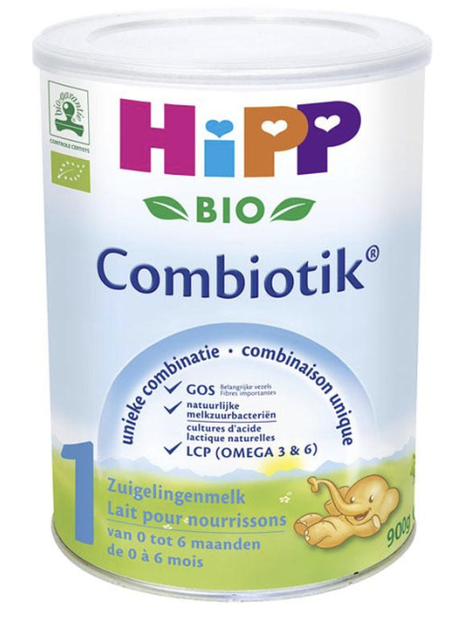
Over the years, I have talked with so many of you about finding the best organic formula for your baby. After I gave birth to my daughter, I did extensive research trying to find the best formula to supplement with - because contrary to myths about motherhood, breastfeeding was not easy for me! Through my research, I came across and and eventually other great options like Topfer, Anti-Reflux, and Hypoallergenic Formula, Kabrita USA, Holle Goat Formula; and the variations on HiPP like: HiPP Dutch, HiPP UK, HiPP Germany, and HiPP PRE. HiPP, and more specifically HiPP Dutch is the best organic formula on the market today. But in 2013, one study was done that indicated HiPP had high levels of aluminum - that naturally many of us (including myself!) were concerned about. So what's a concerned mama to do?? MORE RESEARCH! I dug into the questions surrounding HiPP, and thought this post about the truth behind aluminum in HiPP formula would be helpful to all of you.
So what is the deal with aluminum in HiPP?? Here's what I've found.To start: Here is the study again, and here is an article published about the study.
The highest amount of aluminum found in HiPP was 411 μg/L, which is equal to 0.4 mg/L or 0.4 mg/kg. So there is aluminum in HiPP, but is that a problem? Here are the facts:
- Aluminum is one of the most common, abundant metallic elements on the planet, and exposure to aluminum in small amounts has not been proven to be harmful.
- Aluminum makes up 8% of the Earth's crust and is found naturally in foods like spinach, potatoes and even tea.
- Here is the amount of aluminum occurring in natural, healthy foods compared to HiPP? "Beef, poultry, ham, eggs and fresh fruits have about 1 mg/kg or less of aluminum, according to a report from the Centers for Disease Control and Prevention. The aluminum in different types of fish ranges between 0.1 and 6 milligrams per kilogram. Most fresh vegetables contain 1 to 4 milligrams per kilogram, except for spinach, which has five times more. Tea leaves are one of the rare plants with a very high aluminum content, but not all of it leeches into the water when you prepare a cup of tea. You may get as much as 3.6 milligrams of aluminum per liter of steeped tea. This is about the same amount as fruit juice, but it's four times higher than coffee and other beverages."So basically, if your baby is eating regular, healthy food, they are getting more aluminum from that than was found in HiPP.
Not only was there just one study (done over 5 years ago), no follow ups, and no verifications of the issue from other sources but the study didn't even test all the formulas (like Holle wasn't included). The amount of aluminum found in HiPP is far less than what's in normal, healthy foods. Apparently all of the aluminum levels were all within current guideline limits and there was no evidence they were harmful to children, especially since, again, there is aluminum in food, drinking water/etc.
I also contacted HiPP and here is what they said: "HiPP analyses all the critical raw materials for aluminum contamination on a very regular basis and selects the raw materials with the lowest levels possible to ensure we are providing the safest products possible for babies. The level in our products is kept as low as technically and practicably possible. The level of aluminum in raw materials fluctuates widely as it is an abundant metal in the earth, and this is something we have little control over. The levels of aluminum mentioned in the published studies only show a 'snap-shot' of levels in products and other batches of products, not tested, could very easily have much lower levels. At HiPP we have done analysis of final products and generally the content of aluminum has been found to below the detection limit of 0.5mg/kg powder (much lower than the values found in the study)." They also sent along a statement issued by the SNE (former: IDACE) concerning aluminum in infant nutrition. HiPP posted a more detailed public statement which you can read here.
Based on all of this, I didn't see the aluminum as a big issue. I used HiPP with both of my kids and they did great on it. But ultimately - I'd say go with whichever formula you are the most comfortable with and you should absolutely talk to your pediatrician if you have any concerns or questions. As for where to purchase European baby formulas, I'm in personal contact with the owners of all 4 of these companies: Organic Start (and Organic Start Wholesale), Dutch Expat Shop (cheapest for HiPP Dutch), BabyKindMarket, and Organic Baby Food, and I feel comfortable recommending them to you. Even if you don't go with HiPP, there are plenty of great organic formula options that you can choose for your little one!
Please note that The Picky Eater is not responsible for the quality of the formula or the experience of ordering from any of these sellers listed in this post. Personally, based on my own research, if I were buying European formula for my own child, I would feel comfortable and confident ordering it from Organic Start Wholesale, Organic Start, Organic Baby Food, DutchExpatShop, or BabyKindMarket.
